ASUS G73Jw: Out with the Old, In with the New
by Jarred Walton on November 3, 2010 12:33 AM ESTASUS G73Jw: Application Results
We’ve already seen i7-740QM in the Toshiba A665-3DV, so there’s not much new here. Intel’s quad-core Clarksfield chips are the fastest mobile processors in the market for the time being—at least until Sandy Bridge arrives. The flipside is that Clarksfield isn’t particularly power-friendly, so with the high performance comes poor battery life. ASUS does tend to tweak their systems a bit better than other vendors, so general performance (even with a conventional hard drive) is quite good.
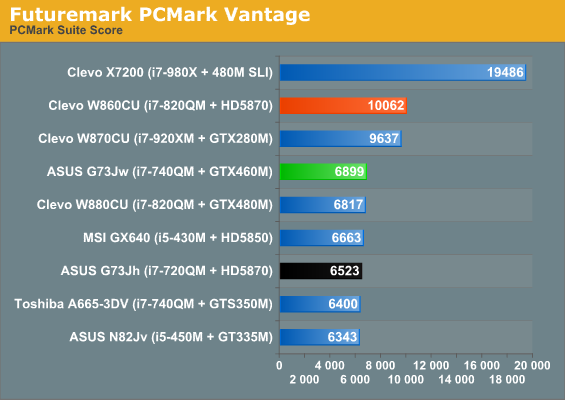
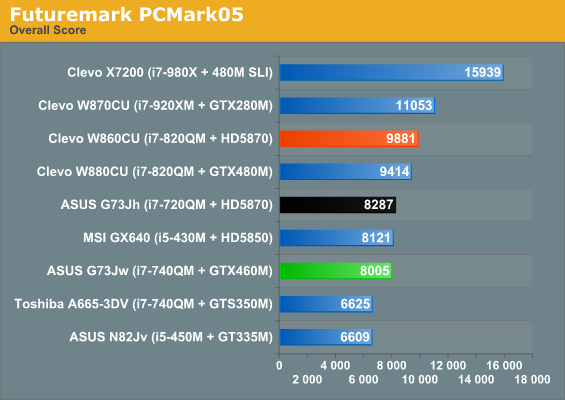
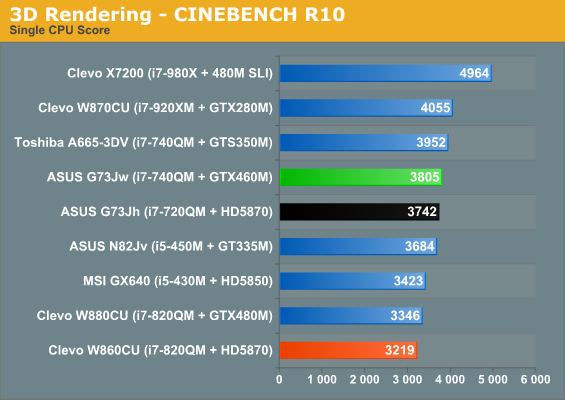
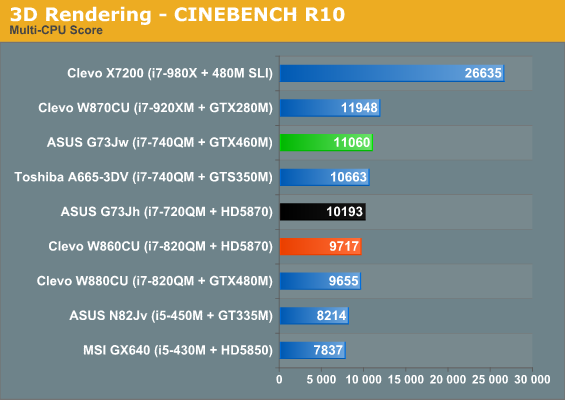
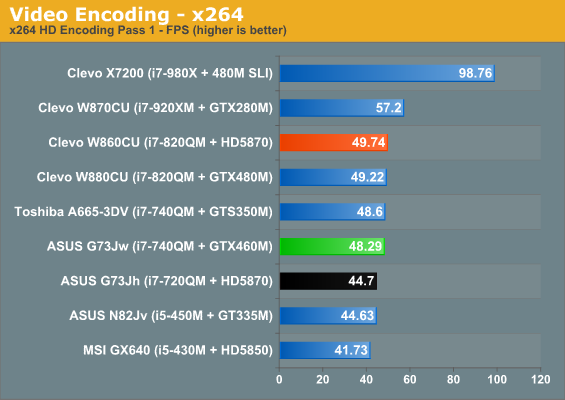
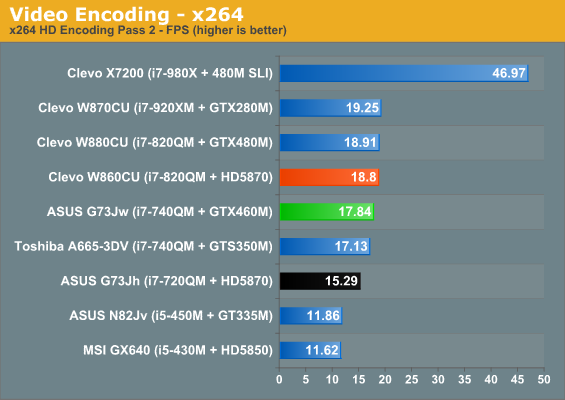
The G73Jw is faster than the similarly equipped A665-3DV in nearly every test, with a particularly large gap in PCMark05. The SSDs in some of the other notebooks provide a massive boost to performance in PCMark, but otherwise the G73Jw falls right in line where we’d expect. It’s also clearly faster than the original G73Jh (8% faster on average, right in line with the clock speed improvement), though the updated version should be the same. Turbo Boost means the i7-740QM is faster in virtually every instance relative to the dual-core Arrandale parts. We don’t have all the parts in the above charts, but even an i5-540M (2.53GHz with up to 3.07GHz Turbo) struggles to establish a clear lead over the 740QM in lightly thread applications; switch to heavily threaded applications and there’s simply no contest.
The only ingredient really missing from the G73 right now is a good SSD to help improve overall responsiveness. With two 500GB hard drives, there’s room for a ton of games, movies, pictures, etc., but we could say the same of a single 500GB drive. Had ASUS gone with a reasonable 80GB SSD for the OS and applications, the price wouldn’t be substantially higher but many tasks would be snappier. Maybe when we get the next generation SSDs with 25nm NAND, prices will reach the point where a decent 80GB SSD will cost as much as a 500GB 7200RPM and ASUS can make the switch. Time will tell, but as far as general performance goes an SSD is the next logical step.










53 Comments
View All Comments
semo - Wednesday, November 3, 2010 - link
When did this site start specializing in laptop reviews?You know you can't buy these in most places and anandtech is very much an international website.
Also, if you are going to be reviewing laptops, you should know that these high powered machines end up killing themselves in very short time. I would want to know what kind of support these devices get (again this is very location specific), are tear down manuals easy to come by, is it easy to replace parts (e.g. are external ports located on removable PCBs or part of the mobo). My recommendation is to always to buy directly from the manufacturer and get the longest possible warranty. Controversial advice, I know, but if you have come across as many bricked laptops as me, you would know where I'm coming from
JarredWalton - Wednesday, November 3, 2010 - link
ASUS has a two-year global warranty, which is better than most. As for the quantity of laptop reviews, first the laptop market has now surpassed desktops in total sales, and second there are many variations on laptops. Sure, they all have a chassis, keyboard, touchpad, LCD, speakers, etc. but there's essentially no upgrading. That means we're not just looking at performance but features, build quality, the display, etc. all in one review so even two "identical" notebooks from different manufacturers need reviewing. So, we now have myself, Dustin, and Vivek doing laptop reviews and we can turn out quite a few in a month. Some will like it, others will prefer something else, but we're not taking away from other reviews just to do these.Aikouka - Wednesday, November 3, 2010 - link
I think that it's nice to see laptop reviews.With the mobile-centric society that we have these days, people are looking to take something at least comparable to their desktop while they're on the road. I know it was quite nice when I went from an old Turion-based HP laptop to my Dell M1530... it could actually do similar things as my home-built desktop without suffering from terrible frame rates! I didn't mind so much that it wasn't as fast, but that it could still perform well enough.
What I do like is that you don't necessarily focus on laptops like that Clevo GeForce 480 SLI laptop, but rather laptops that are modestly priced and can serve as "desktop complements" rather than "desktop replacements".
sanjeev - Wednesday, November 3, 2010 - link
"...It’s a good panel with an extremely high contrast ration"?
JarredWalton - Wednesday, November 3, 2010 - link
You have no idea how many times I type "ration" instead of "ratio"! I usually catch it but it slipped through this time. All those other words have hardwired my brain to type "-tion" I guess.tech6 - Wednesday, November 3, 2010 - link
Nice review but what is it with Asus and those cryptic laptop model names that nobody can remember?Also - there are other manufacturers of laptops, so an occasional review of a non-Asus laptop would also be welcome.
freespace303 - Wednesday, November 3, 2010 - link
Any chance you'll be reviewing the Envy 17 3d this thoroughly when it comes out? Or is HP still being stubborn?roninmagik1 - Wednesday, November 3, 2010 - link
where is the dell xps review?? that's what we are all waiting for!!! =)barnett25 - Wednesday, November 3, 2010 - link
I second that!JarredWalton - Wednesday, November 3, 2010 - link
Coming real soon. :-D